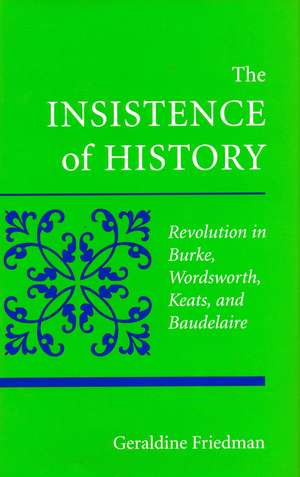The Insistence of History: Revolution in Burke, Wordworth, Keats, and Baudelaire
Autor Geraldine Friedmanen Limba Engleză Hardback – 30 sep 1996
Through a series of theoretically informed readings, this book explores the uncanny effectivity of history in its seeming absence in canonical works by Burke, Wordsworth, Keats, and Baudelaire written in the shadow of the French Revolution and the Revolution of 1848. The book begins with the discovery that, in these writers, issues of narration and figuration are already taken up in the political and historical questions raised by the two revolutions; conversely, historical-political positioning and representation are involved from the beginning in problems of narration and figuration.
This co-implication of aesthetics and history in each other has profound consequences: once historical events take the form of figures, they no longer act as literal, material referents but rather interrogate the status of reference itself. Far from being denied, history becomes a problem for analysis, one whose normative frames of understanding and founding concepts, such as “event,” “experience,” and “chronology,” must be rethought. This can be most easily seen in the fact that the four writers, in their different ways, all miss historical occurrence—not when they try to flee it, as many older accounts of Romanticism have claimed, but just when they attempt to engage it most intensely.
This co-implication of aesthetics and history in each other has profound consequences: once historical events take the form of figures, they no longer act as literal, material referents but rather interrogate the status of reference itself. Far from being denied, history becomes a problem for analysis, one whose normative frames of understanding and founding concepts, such as “event,” “experience,” and “chronology,” must be rethought. This can be most easily seen in the fact that the four writers, in their different ways, all miss historical occurrence—not when they try to flee it, as many older accounts of Romanticism have claimed, but just when they attempt to engage it most intensely.
Preț: 475.79 lei
Preț vechi: 587.39 lei
-19% Nou
Puncte Express: 714
Preț estimativ în valută:
91.04€ • 95.30$ • 75.78£
91.04€ • 95.30$ • 75.78£
Carte tipărită la comandă
Livrare economică 31 martie-14 aprilie
Preluare comenzi: 021 569.72.76
Specificații
ISBN-13: 9780804725446
ISBN-10: 0804725446
Pagini: 284
Dimensiuni: 185 x 224 x 25 mm
Greutate: 0.5 kg
Ediția:1
Editura: Stanford University Press
Colecția Stanford University Press
ISBN-10: 0804725446
Pagini: 284
Dimensiuni: 185 x 224 x 25 mm
Greutate: 0.5 kg
Ediția:1
Editura: Stanford University Press
Colecția Stanford University Press
Recenzii
“Friedman has written a powerful, rigorous, and intense work that combines in an original and advanced way two of the most vital (and hitherto usually antagonistic) directions of post-structuralist literary criticism: historicism and deconstruction. And she accomplishes this feat of strategic positioning without sacrificing her considerable tactical skills for local reading. Mediating between broad theoretical reflection and the closest kind of textual scrutiny, her readings are throughout inventive, adept, capable of surprise.”—Alan Liu, University of California, Santa Barbara
Notă biografică
Geraldine Friedman is Associate Professor of English at Purdue University.
Textul de pe ultima copertă
“Friedman has written a powerful, rigorous, and intense work that combines in an original and advanced way two of the most vital (and hitherto usually antagonistic) directions of post-structuralist literary criticism: historicism and deconstruction. And she accomplishes this feat of strategic positioning without sacrificing her considerable tactical skills for local reading. Mediating between broad theoretical reflection and the closest kind of textual scrutiny, her readings are throughout inventive, adept, capable of surprise.”—Alan Liu, University of California, Santa Barbara
Descriere
Through a series of theoretically informed readings, this book explores the uncanny effectivity of history in its seeming absence in canonical works by Burke, Wordsworth, Keats, and Baudelaire written in the shadow of the French Revolution and the Revolution of 1848.
